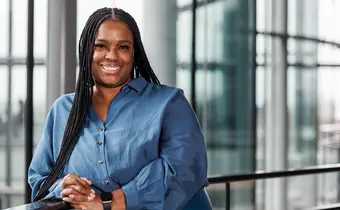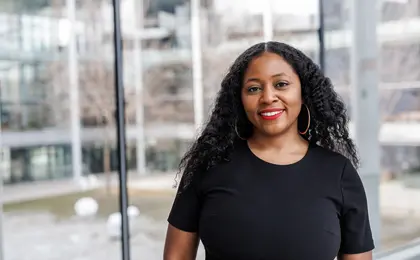
Savina Woodyard ’24
Master’s Degree in Public Education Management
Chief equity and strategy officer, KIPP Public Schools Northern California
In the post-pandemic era, the K-12 public education landscape has presented a myriad of challenges that directly affect students. The impact of distance learning, particularly on students of color and those from under-resourced communities, has been profound. District leaders need to be innovative and strategic in fulfilling our commitment to students, families, and communities.
I came to Yale SOM to deepen my strategic thinking skills in community with amazing, like-minded leaders. In the face of these challenges, it is essential that we adapt our education policy to today’s realities and create and communicate compelling narratives that influence key stakeholders.


A number of my Yale SOM courses have been immediately relevant in my role. Inequality, Systems, and Society challenged us to consider the root causes of inequities in the K-12 system from a variety of perspectives. The coursework is rigorous, and it leverages our cohort’s collective power to ideate and problem solve. One core function of my job is ensuring that our district is living out our commitment to diversity, equity, and inclusion. We do this by creating conditions that cultivate the brilliance of our children—particularly our Black children. If they aren’t thriving, we’ve got to rethink what we’re doing.
Everyday Leadership offered a refreshing reminder to reflect on how our work impacts us as individuals and as a team. My favorite exercise was the Reflected Best Self activity, in which we solicited feedback from peers, colleagues, and loved ones about our strengths and the moments when we have shown up as our best selves. As a leader, it’s easy to focus on what has not gone well, versus acknowledging where things have gone well and my contribution to them. This exercise was a game changer in how I approach my work.
I want to be the kind of leader who, above all else, puts students first. They’re the center of everything we do. I’m committed to educational equity, to raising the achievement of all students while narrowing the gaps between the highest and lowest performers. To move this complex work forward, it’s essential to build relationships with key stakeholders. In a school setting, people need to feel that they can approach you and that you’re willing to engage in conversation. This doesn’t mean they’ll always get what they want, but it does mean that, as a leader, you need to be able to hold people’s hands while also holding their feet to the fire to ensure we’re getting the best outcomes for children. I think one of the most impactful things I’ve learned at Yale SOM is the necessity of framing challenges and opportunities so that they can be viewed as mutually beneficial for multiple stakeholders, in order to serve our students.



